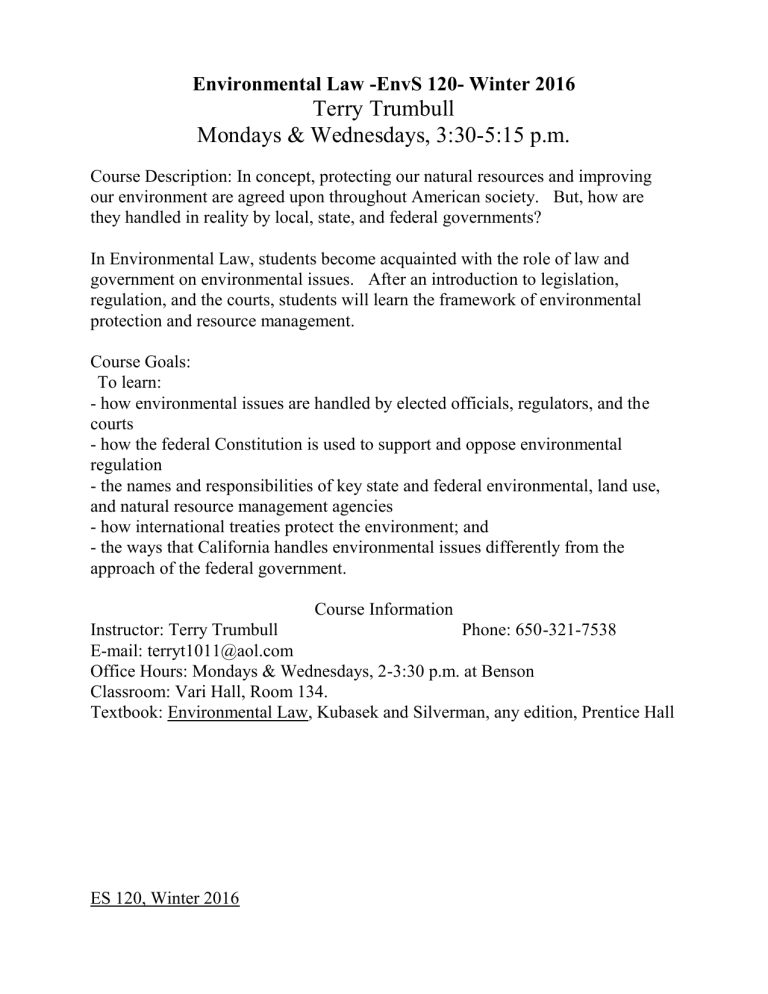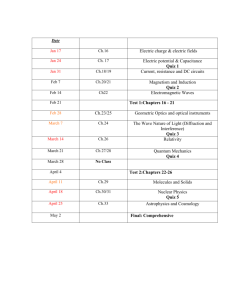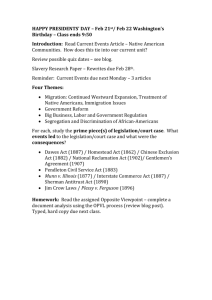Environmental Law -EnvS 120- Winter 2016 Terry Trumbull

Environmental Law -EnvS 120- Winter 2016
Terry Trumbull
Mondays & Wednesdays, 3:30-5:15 p.m.
Course Description: In concept, protecting our natural resources and improving our environment are agreed upon throughout American society. But, how are they handled in reality by local, state, and federal governments?
In Environmental Law, students become acquainted with the role of law and government on environmental issues. After an introduction to legislation, regulation, and the courts, students will learn the framework of environmental protection and resource management.
Course Goals:
To learn:
- how environmental issues are handled by elected officials, regulators, and the courts
- how the federal Constitution is used to support and oppose environmental regulation
- the names and responsibilities of key state and federal environmental, land use, and natural resource management agencies
- how international treaties protect the environment; and
- the ways that California handles environmental issues differently from the approach of the federal government.
Course Information
Instructor: Terry Trumbull Phone: 650-321-7538
E-mail: terryt1011@aol.com
Office Hours: Mondays & Wednesdays, 2-3:30 p.m. at Benson
Classroom: Vari Hall, Room 134.
Textbook: Environmental Law, Kubasek and Silverman, any edition, Prentice Hall
ES 120, Winter 2016
Grading:
Glossary 20%
Quizzes (6 @ 5% each) 30%
Appellate Case Evaluation 4%
Final 33%
Class Participation 12%
Governmental Meeting 1%
Notes on grading:
Glossary:
The glossary is a list of about 200 commonly used environmental terms and acronyms. It is due by the start of the Feb. 1 class. If you turn it in earlier, you get one extra point per week(maximum of 4). If you turn it in late, a point is deducted for each class that it is late. You are allowed to work with others to prepare your glossary, but you must be the person that writes every single word in the glossary that you submit.
Class participation/Environmental articles:
For each class meeting, students are expected to bring a printed article on the subject of the class from a recent publication. Your article shall be turned in before the start of class. You should expect to discuss your article with the class.
Students are not expected to explain the underlying legal issues, but should be prepared to summarize the facts in the article. Discussion in class of your article, or in any other way, gives you a point in class participation.
Academic Integrity:
The penalty for cheating or plagiarism is a failing grade for the course, and the
University may take further disciplinary action. Plagiarism means representing the work or ideas of others as one’s own without giving proper acknowledgment.
The University policy concerning academic integrity can be viewed at http:www.scu.edu/provost/policies/academicpoliciesprocedures.cfm.
ES 120 Syllabus, Winter 2016
Disability Accommodation Policy:
To request academic accommodations for a disability, students must contact
Disability Resources located in the Drahmann Center in Benson, Room 214, (408)
554-5445. Students must provide documentation of a disability to Disability
Resources prior to receiving accommodations.
Class website: The class website is trumbulllaw.weebly.com.
http://groups.yahoo.com/group/trumbull_law_classes/.
The site includes my lecture notes, a sample quiz, the glossary terms, suggestions on writing for the class, the two final study sheets, directions to the federal courthouse, and other things helpful for the class. I also post announcements that have come up since the last class session.
Course Schedule
Class Date Topic
Reading Notes
1 Jan. 4 Overview of class; Self introduction; Ch.1
U. S. Constitution and the Environment
2 Jan. 6 Environmental torts Ch. 2
App. Case due
3 Jan. 11 Environmental Agencies
Quiz 1
4 Jan. 13 Land Use
Ch. 3 Quiz 2
Jan. 18 Holiday
5 Jan. 20 Environmental Impact Analysis Ch. 4
6 Jan. 25 Intergovernmental pollution control model
Jan. 27 No class
7 Feb. 1 Air pollution control Ch. 5
Glossary due 8 Feb. 3 Water pollution control
Ch. 6 Quiz 3
9 Feb. 5 Federal courthouse tour, 280 S. First St., SJ 95113, 1:30-4:15 p.m.
10 Feb. 8 Prevention of Ground Pollution Ch. 7
11 Feb. 10 Cleanup of Ground pollution Ch. 8
Quiz 4
Feb. 15 Holiday
12 Feb. 17 Energy
Ch. 9
13 Feb. 22 Energy/Water Resources Ch. 10
Quiz 5
14 Feb. 24 Alaskan Oil Mediation
15 Feb. 29 Endangered Species/Forests/Public Lands
16 Mar. 2 Oceans
Ch. 11
17 Mar. 7 Int. Env. Law;
Quiz 6
18 Mar. 9 Population; Review for final
19 Mar. 14 Final



